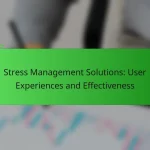Managing stress effectively is crucial for busy professionals seeking to enhance their productivity and well-being. By choosing solutions that seamlessly integrate into your daily routine, you can find methods that not only reduce stress but also promote relaxation and mindfulness. Consider your lifestyle, budget, and the experiences of others to select the right fit for your needs.
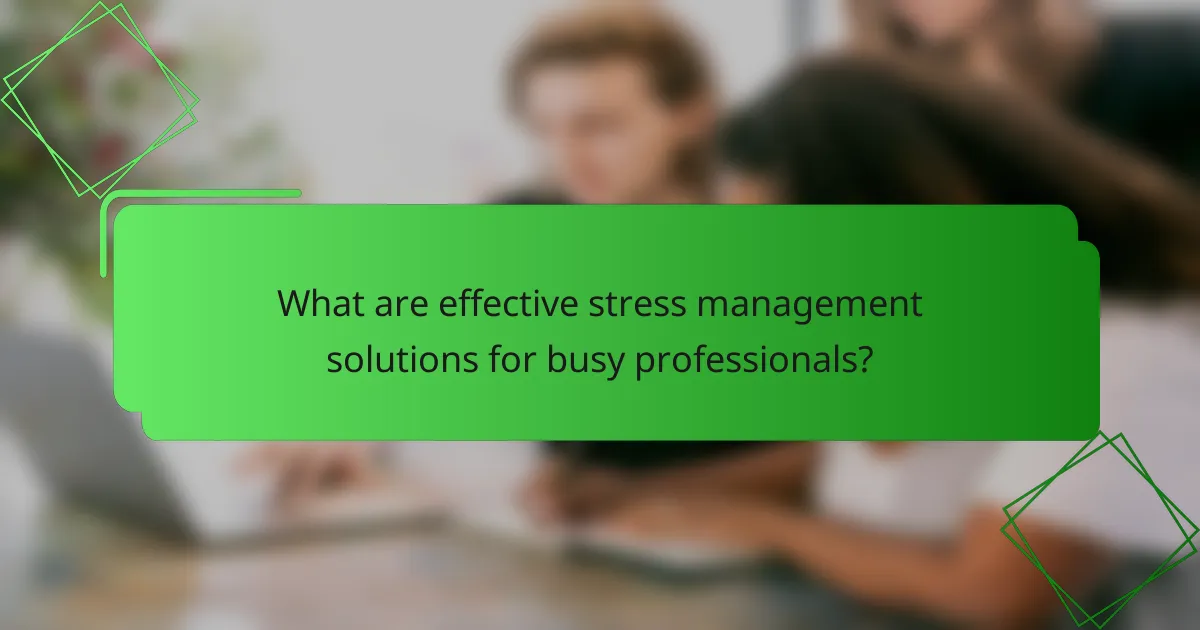
What are effective stress management solutions for busy professionals?
Effective stress management solutions for busy professionals include techniques and tools that fit seamlessly into a hectic schedule. These solutions can help reduce stress levels, enhance productivity, and promote overall well-being.
Mindfulness meditation apps
Mindfulness meditation apps are designed to help users practice mindfulness and reduce stress through guided sessions. Popular options like Headspace and Calm offer short sessions that can easily fit into a busy day, often ranging from just a few minutes to half an hour.
When selecting an app, consider features such as user interface, variety of meditation styles, and whether it offers personalized plans. Many apps also provide reminders to encourage consistent practice, which can be beneficial for maintaining a routine.
Time management tools
Time management tools help busy professionals organize their tasks and prioritize effectively, which can significantly reduce stress. Tools like Trello, Asana, or Todoist allow users to break down projects into manageable tasks and set deadlines.
To maximize effectiveness, choose a tool that integrates well with your existing workflow and offers features such as reminders and progress tracking. Regularly reviewing and adjusting your task list can also help maintain focus and reduce feelings of overwhelm.
Online therapy platforms
Online therapy platforms provide convenient access to mental health professionals, making it easier for busy individuals to seek support. Services like BetterHelp and Talkspace offer flexible scheduling and various communication methods, including video calls and messaging.
When considering online therapy, check for licensed therapists and ensure the platform complies with local regulations. Many platforms offer free trials, allowing you to assess the service before committing financially.
Fitness tracking wearables
Fitness tracking wearables, such as Fitbit or Apple Watch, can help busy professionals monitor their physical activity, sleep patterns, and stress levels. These devices often include features like heart rate monitoring and guided breathing exercises to promote relaxation.
To choose the right wearable, consider factors such as battery life, compatibility with your smartphone, and the range of health metrics tracked. Regularly reviewing your data can help you identify stress triggers and adjust your lifestyle accordingly.
Stress relief courses
Stress relief courses, available online or in-person, teach techniques to manage stress effectively. Options may include yoga, tai chi, or workshops focused on stress management strategies, often lasting from a few hours to several weeks.
Look for courses that fit your schedule and offer practical tools you can apply in daily life. Many community centers and wellness organizations provide affordable options, making it easier to invest in your mental health without significant financial strain.
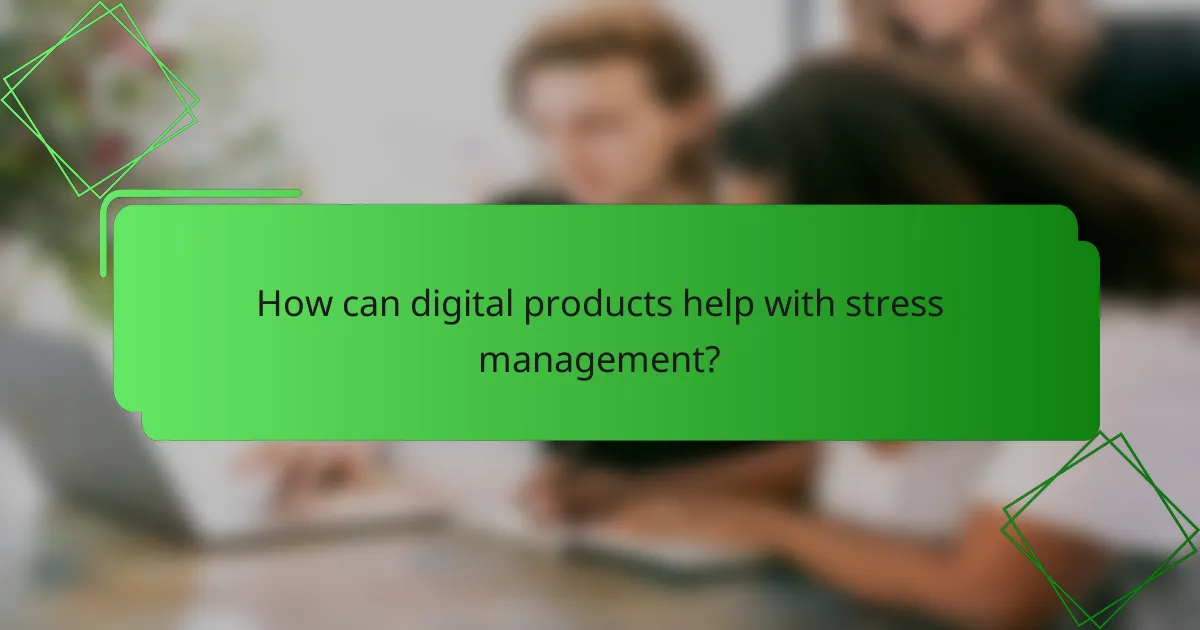
How can digital products help with stress management?
Digital products can significantly aid in stress management by providing accessible tools and resources tailored to individual needs. These solutions often include guided sessions, educational content, and interactive features that promote relaxation and mindfulness.
Guided meditation programs
Guided meditation programs offer structured sessions led by experienced instructors, helping users focus and relax. Many platforms provide a variety of themes, such as stress relief, sleep enhancement, or anxiety reduction, allowing users to choose what fits their current needs.
When selecting a program, consider factors like duration, style, and the instructor’s background. Programs can range from a few minutes to over an hour, making it easy to fit them into a busy schedule.
Stress management webinars
Stress management webinars are live or recorded sessions that cover various techniques and strategies for coping with stress. These webinars often feature experts who share insights on topics like time management, mindfulness, and emotional resilience.
To maximize the benefits, look for webinars that offer interactive elements, such as Q&A sessions or practical exercises. Many platforms provide free or low-cost options, making it easy to access valuable information without a significant financial commitment.
Mobile relaxation apps
Mobile relaxation apps provide on-the-go access to tools for managing stress, including breathing exercises, soundscapes, and guided meditations. These apps typically feature user-friendly interfaces and customizable settings to enhance the user experience.
When choosing an app, consider its features, such as offline access, progress tracking, and community support. Many apps offer free trials or basic versions, allowing users to explore their options before committing to a subscription.
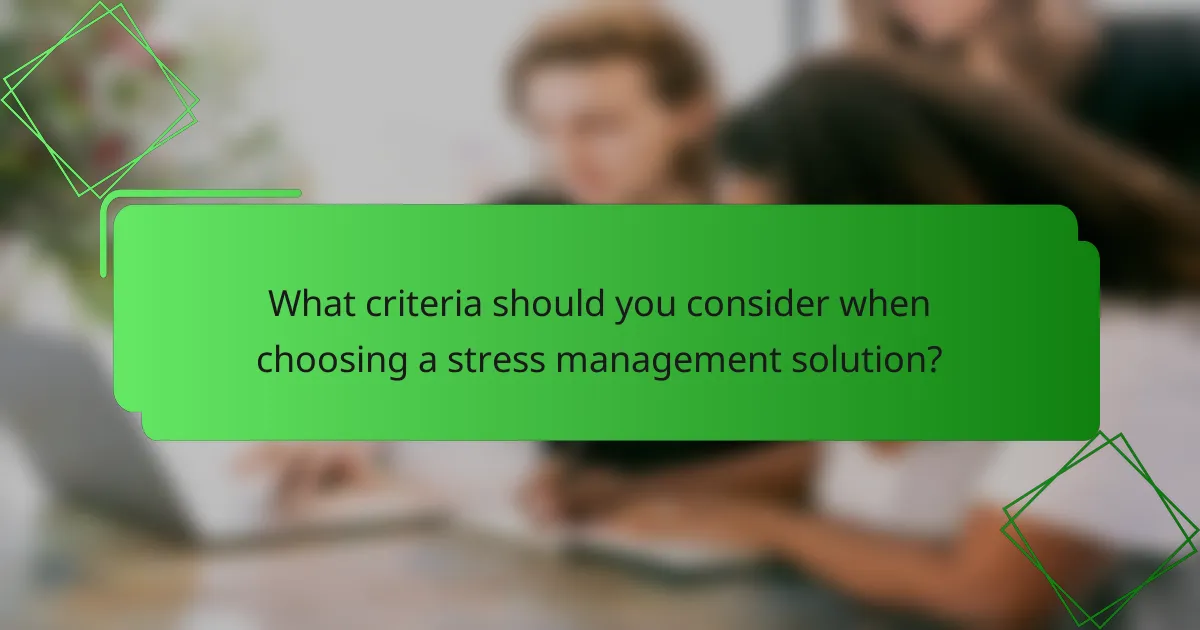
What criteria should you consider when choosing a stress management solution?
When selecting a stress management solution, consider how well it aligns with your daily routine, budget, and the experiences of others. These factors will help you find a method that is effective and sustainable for your lifestyle.
Personal lifestyle compatibility
Your chosen stress management solution should fit seamlessly into your daily life. For instance, if you have a busy schedule, techniques like short mindfulness exercises or mobile apps may be more suitable than lengthy classes or workshops.
Consider your preferences as well. If you enjoy social interactions, group classes or workshops might be more appealing than solitary practices like journaling or meditation. Assessing your lifestyle compatibility can enhance your commitment to the solution.
Cost and subscription models
Evaluate the cost of different stress management options, including any subscription fees. Many apps offer free trials, allowing you to test their features before committing to a paid plan. Prices can range from free to monthly subscriptions in the low tens of USD.
Look for hidden costs, such as additional materials or classes that may not be included in the initial fee. Understanding the total financial commitment can help you avoid unexpected expenses.
User reviews and testimonials
Reading user reviews and testimonials can provide valuable insights into the effectiveness of a stress management solution. Look for feedback on how well the method worked for others with similar lifestyles and stress levels.
Pay attention to both positive and negative reviews to get a balanced view. Consider platforms where users share their experiences, such as app stores or wellness forums, to gauge overall satisfaction and potential drawbacks.
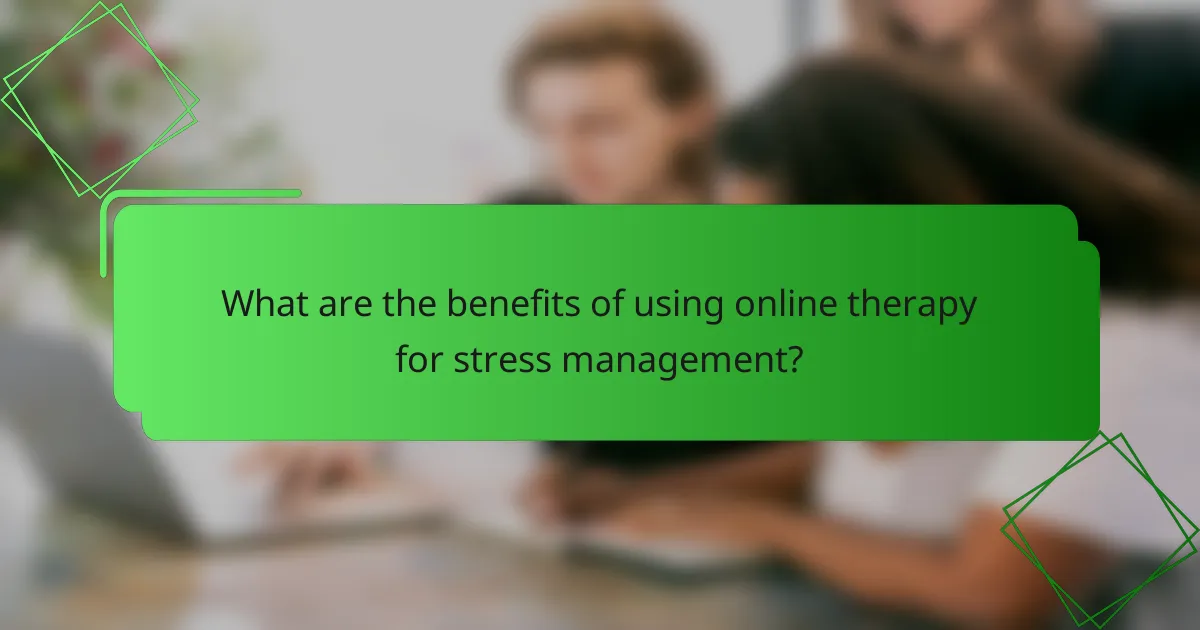
What are the benefits of using online therapy for stress management?
Online therapy offers significant benefits for stress management, including convenience, accessibility, and a range of therapeutic approaches. It allows individuals to seek help from licensed professionals without the constraints of travel or rigid scheduling.
Accessibility from home
One of the primary advantages of online therapy is that it can be accessed from the comfort of your home. This eliminates the need for commuting, making it easier for those with busy schedules or mobility issues to engage in therapy sessions.
Additionally, online platforms often provide a secure and private environment, which can help individuals feel more at ease discussing their stressors. This accessibility can lead to increased participation and commitment to the therapeutic process.
Flexible scheduling
Online therapy typically offers more flexible scheduling options compared to traditional in-person sessions. Many therapists provide evening and weekend appointments, accommodating various lifestyles and commitments.
This flexibility allows individuals to choose times that best fit their routines, making it easier to integrate therapy into their lives. It’s important to communicate your availability with your therapist to find a suitable schedule.
Variety of therapy styles
Online therapy provides access to a diverse range of therapeutic styles, including cognitive-behavioral therapy (CBT), mindfulness-based therapy, and more. This variety allows individuals to select an approach that resonates with their personal preferences and needs.
When choosing a therapist, consider exploring their specialties and methodologies to find the best fit for your stress management goals. Many platforms also allow you to switch therapists if your initial choice doesn’t meet your expectations.
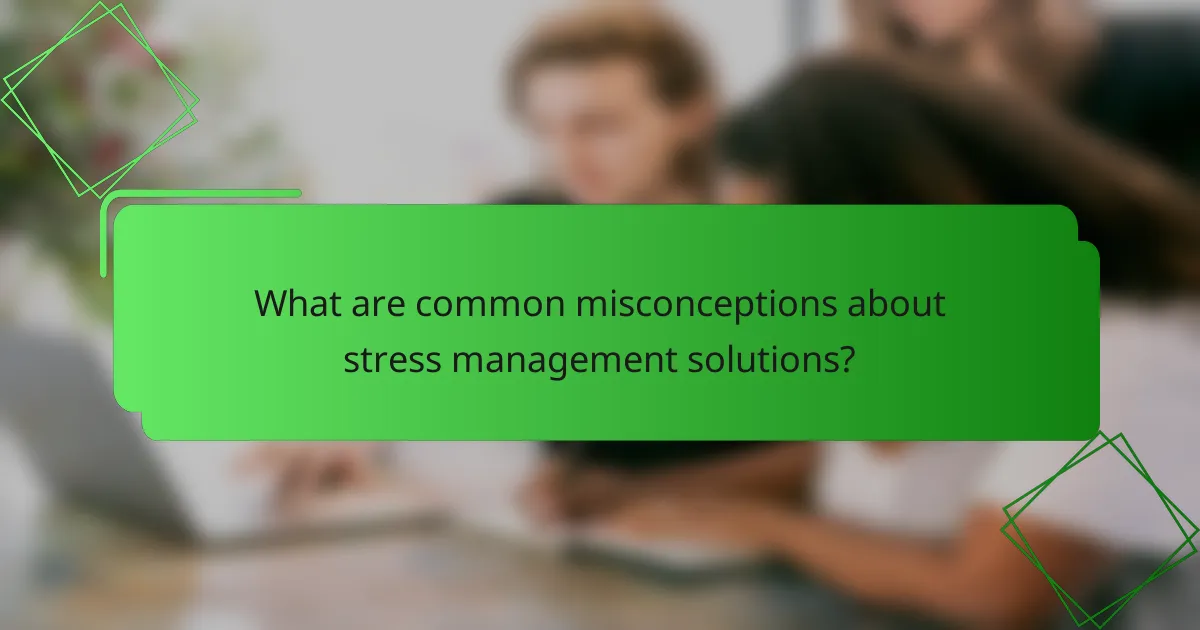
What are common misconceptions about stress management solutions?
Many people believe that stress management solutions are one-size-fits-all, but this is not true. Individual needs vary greatly, and what works for one person may not be effective for another. Additionally, some assume that stress management is only about relaxation techniques, overlooking the importance of lifestyle changes and mental health support.
Effectiveness of self-help resources
Self-help resources, such as books, apps, and online courses, can be effective for many individuals seeking to manage stress. These tools often provide practical strategies and techniques that can be easily integrated into daily life. However, their effectiveness largely depends on personal motivation and the specific methods employed.
When considering self-help resources, it’s essential to evaluate their credibility and relevance to your situation. Look for materials backed by research or authored by qualified professionals. Additionally, combining self-help methods with professional guidance can enhance their effectiveness, especially for those dealing with significant stressors.
Common self-help techniques include mindfulness practices, journaling, and time management strategies. For instance, dedicating just a few minutes each day to mindfulness meditation can significantly reduce stress levels. However, be cautious of resources that promise quick fixes; sustainable stress management typically requires ongoing effort and commitment.


